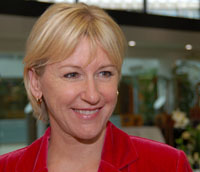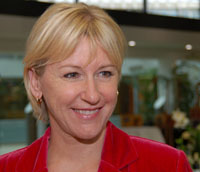Government blogs: the person behind the political face

 Just a few lines, but they say a lot about the person:
Just a few lines, but they say a lot about the person:
By Friday I had to get up to prepare for a dinner at home with Her Royal Highness Crown Princess Victoria of Sweden as one of the guests (!) She accepted gracefully the not so professional service (= me and my husband not always knowing from which side to serve our homemade food) and was a great guest!
Those words are from the latest entry in Commission VP Margot Wallström’s blog – a very personal sentence, heavy with political meaning for this centre-left politician, originally from Skellefteå: if a political blog is nothing more than presenting government information and adding a comment function, then is it worth bothering at all? Wallström manages to convey a picture of her as a person, building a rapport of sorts with her readership.
Much as I admire him as a politician, David Miliband’s blog is often rather dry and the presentation is even more dull. Phil Woolas’s Bali Diary had promise, but will there be more? The DWP blog (now closed) was an example of what not to do – tedious. Interestingly if you type ‘UK Government Blogs‘ into Google you get the Microsoft UK Government Blog as the number 1 result. Miliband’s blog is powered by some gruesome Microsoft technology (it has a .net favicon) so perhaps that’s the root of the problem – does government actually have any people working within its IT who – both in terms of programming or strategy – have any clue about the blogosphere? Looking at Margot’s blog should be the first these people should do.
[UPDATE – 08.01.2008]
I’ve just come across some more analysis of these matters from Stuart Bruce and PR Blogger, looking at governmental blogs and what is and is not party political.
Government blogs can be interesting and dull!
Some will put a little too much information on their blogs and will be called to question about it.
They give people a chance to know the person not the public image.
I have no doubt the government and other parties will have people checking blogs for content which should be deleted,sadly thats the world we live in.
mMark
Then we go down the UK line – government blog or not… There was a reason Harriet Harman’s blog was on her website and it’s stayed that way (although she seldom posts now) – it was that it allowed far greater freedom than you ever might get on a government blog.
The danger however with a purely party-political approach is that you end up with something like Tom Watson’s blog – fun sometimes, but you wonder what the point is. Beyond that I don’t think Labour has a blogging strategy overall, so I don’t think things are likely the change any time soon.
I wonder how any UK politicians might manage to emulate Margot’s blog – a delicate balance between Commission information, analysis, and personal anecdotes. I’m not holding my breath.
Jon,
I posted something on this general subject a while ago – here:
http://nevertrustahippy.blogspot.com/2006/03/minister-blogging-yet-another.html
Thanks for the comment… Part of the idea for the post came from some discussions a long time ago in the UK with the people from the Government News Network – I asked them how they monitored blogs, and the answer was that they did not. At the same time David Miliband was already writing a blog for Defra.
It seemed to show an important failing at the heart of UK government communications – the main machine still geared up for the traditional media, and a handful of ministers wanting to try something different. It wouldn’t surprise me if the same sort of thing was happening in the Commission.
According to the FT the government has now started to monitor blogs, but I think the problem more or less remains.
Jon, I think you have hit upon something here. Finding an authentic and truthful voice as a blogging politician is always going to be a difficult one. Especially if one holds a position in an executive governed by collegiate responsibility.
I was speaking recently to one of Dimas’ team that remarked upon this. On policy, it’s always going to be unlikely that he says anything that you can’t read in his department’s latest Communication. However, there is a temptation to use the blog as a means to push his own line in internal Commission debates. Reading between the lines of some posts, you can see those disagreements between Commissioners being played out.
Personally, I like Margot’s blog and I think the personal insights into her life are actually the bits of interest. Politicians are always more interesting up close and personal. Ok, it takes more of a diary format, but given her portfolio it works well. The vacuous objective of communicating better probably means she is successful just by having one.
Jon, surely you are right about blogs offering the chance to strike a personal note (for those who want to), but I wouldn’t be that dogmatic.
Blogs are a means of publishing, and I think that they offer an array of opportunities, from cat owners’ bliss to news reporting and serious comment.